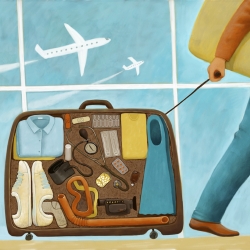 If you dare ask any doctor their best experience at medical school then you’d better be prepared for hours of mind-numbing stories from their medical elective – and if you’re really unlucky they’ll even whip out a photo album bigger than the entire Encyclopaedia Britannica.
If you dare ask any doctor their best experience at medical school then you’d better be prepared for hours of mind-numbing stories from their medical elective – and if you’re really unlucky they’ll even whip out a photo album bigger than the entire Encyclopaedia Britannica.
Your medical elective is guaranteed to be an amazing experience – and it’ll soon be your eyes that light up when you get the chance to subject some unknowing medical student to stories of your time debriding ingrown toe-nails in the outer depths of Timbuktu.
Right now you’re probably more scared than excited about your elective. You’ve just travelled 200 miles to medical school and that was traumatic enough. Hitch-hiking 3,000 miles into the deepest, darkest depths of the Amazon rainforest where people screw up their faces in confusion when you ask directions to the nearest McDonalds probably doesn’t seem that appealing right now.
Well, it will. After you’ve endured the wrath of an ex-med student’s elective epilogue and a similar dose of ‘Wish You Were Here?’ you’ll wish you were anywhere but here. It’ll be all you think of for a while – perfect for daydreaming your way through all those neurology lectures.
On the downside however it’s not quite as easy as booking a last minute package holiday off Teletext. There’s a lot of planning to do. But don’t worry, follow our guide below and we’ll get you half way there – the rest is up to you.
So when do I get exported?
Virtually all med schools have their elective periods towards the end of fourth year or during final year. Most have finally developed enough common sense to have final exams before you go meaning you no longer have to use half your baggage allowance for revision textbooks.
Some schools split the year into groups allowing them to go at different times. Use this to your advantage if you’re going to the southern hemisphere and want to be there in summer. Tell the registry early and get them to put you in that group. You’ll also find that some of the more specialised elective programs only take students during certain months.
How long can I be away for?
The average elective period allocated by medical schools is eight weeks. Most throw in a few weeks holiday afterwards so you can top-up your tan before returning back to tease your mates. These are a ‘reward’ for the two months of hard work that you have (in theory) completed.
If your curriculum includes special study modules there’s a good chance you’ll be able to attach these to your elective period. Four weeks cardiology is much more bearable when you can spend your lunch breaks on a sunny beach in the Caribbean rather than staring out through a rainy hospital canteen window in Britain.
Where to go?
Whale watching off the coast of Australia?? Or trauma training in Tanzania?? … choosing your destination is the toughest decision you’ll have to make when planning your elective. You’ll need to decide whether you’re aiming for a pure holiday, some real medical experience or want to combine a bit of both.
Florida may be great for riding the rollercoasters at Disneyworld and checking out the babes on the beach but it’s not going to give you the same life-defining experience as visiting a remote desert tribe in Africa with a medical outreach team.
Other options
Still don’t have a clue where? Here’s some useful feedback from students who’ve visited the most popular destinations.
Still not found the location for that perfect elective? Don’t give up yet, there’s plenty of options that don’t fit the standard elective package. If you like to be different then here’s some suggestions …
NASA (Kennedy Space Center) – Very, very competitive. You need to apply a few years in advance and have enough ‘special interests’ to justify your selection. You’ll get to spend time with the medical team supervising astronaut training and selection. There’s also a chance to help with research into space and aviation. Placements usually only last a couple of weeks but can easily be attached to additional rotations in the US.
Royal Flying Doctor Service of Australia – Not too difficult to get onto – even at the last minute!! All reports from students have been great. You’ll fly to remote communities in the outback to offer GP-type services and emergency aid. Most units are attached to a major hospital or clinic so you can experience the best of both worlds.
Cruise Ships – Fantastic chance to visit some of the best and most exclusive countries in the world. Difficult to get the med school to understand that you’re not just having a holiday, and to persuade the cruise company to accept you at a free/discounted fare.
HM Prisons – If you’ve always wanted to experience life behind bars here’s the easy way – without even having to commit a crime. Placements are available with experienced GPs in both Belmarsh (London) and Frankland (Durham) Prisons. Support is available for accommodation and they promise no bars on your windows.
Amazon Health Team – If you don’t mind bugs, snakes and swimming with piranhas this could be the elective for you. You’ll journey deep into the rainforest with doctors visiting tribes offering medication and immunisations. Definitely an elective you’ll never forget … if you make it back in one piece!!
www.amazonafrica.org/Volunteer.html
Himalayan Health Exchange – Looking for one BIG elective?? … well you can’t get bigger than this. This elective placement based in the shadow of Mount Everest is a well-structured program revolving around community and international health provision. It’s designed with a mountain expedition in mind before or after the program – if you find that kind of thing appealing.
www.himalayanhealth.com/student.htm
How do I get a placement?
Now that you’ve decided a month in outer Mongolia is the elective for you, the next challenge is to find a placement that will take you on. To do this you’ll need to contact a hospital or medical school in the destination you’ve chosen. The best way is to ask around to find someone who has been to the same region. If however you’ve chosen some far flung part of the world where no medical student has ever ventured before, then the next step is to get hooked up to the web.
MedicsTravel (www.medicstravel.co.uk) is an ideal starting point. It’s got a list of countries along with contact details of the relevant medical institutions. You’ll find the telephone numbers, addresses and websites of all the possible destinations. A print version is also available – ‘Medics Guide to Work and Electives Around the World’ (Mark Wilson; ISBN 0340760982).
If you can’t find an institution in your chosen destination try searching Google, or an equivalent search engine. If the hospital is lucky enough to have a website try to find the teaching coordinator or equivalent. If not, email the main hospital address and ask for the details of the person who deals with elective enquiries.
Email is definitely the best option for arranging electives. Writing letters is commonly suggested but it’s painfully slow and unreliable. Don’t be afraid to follow-up any correspondence by telephone as this is often the only way to get a response.
Once you’ve been accepted ask for confirmation. Remember that your medical school will require some written documentation that you have been accepted on a program.
Raising the cash
Travelling the world can be an expensive experience, but don’t panic if your current budget only stretches to a weekend in Brighton. There are plenty of charities and trust funds willing to help pay for that plane ticket to paradise.
On the following pages you’ll find a list of some on offer. Remember that they’re not all going to be open to your plans but it’s worth checking which might support you. Contact those that are appropriate and ask for an application form.
In return they may ask you to submit a report on your elective experience, or make a short presentation at one of their events. It may sound harsh but it’s not a bad exchange for a round-the-world plane ticket.
Still short of that all important total?? Here’s some additional ideas for raising those few extra pounds.
Sell yourself – Many businesses have cash set aside to spend on good causes. Try smaller local firms first as they’re often more willing to part with the cash. Offer them something in exchange – maybe you’d come in after you return and give a slide show. I managed to cover the cost of an entire month’s desert expedition simply by offering to take photos of companies logos and products in the dunes – sure I felt daft holding up wet-wipes in front of a camel but it was worth it!!
Voluntary Service Overseas (VSO) – VSO is an organisation which will help support your travel and expenses if you get involved in one of their projects. They’ve many health attachments on offer from public education to local health development. Full details are available on their website.
Local Education Authority (LEA) – If you currently receive a maintenance grant you may be able to persuade your LEA to cough up some cash. Your elective is a compulsory part of the medical curriculum and as such you should get support towards travel and living expenses. As usual it depends where you live but it’s definitely worth a try.
Take out a loan – If it’s the only option left then it’s worth considering. Paying back the cost of your elective when you’re qualified and rolling in cash shouldn’t be too much of a strain. It’s better than looking back with eternal regret that you didn’t spend your elective how you dreamed. Check out the ‘professional study loans’ offered by most high street banks.
Visas – Have a good think about which countries you might want to visit before you leave the UK and organise the visas here – it’s so much easier than negotiating when you arrive.
Bank Account – If you’re staying for a long time in one country it can be worth opening a local bank account. It means you’ll be able to withdraw cash for free. You can often open an account through one of their branches in the UK.
Some UK banks also allow you to withdraw cash overseas for free. For example, with Barclays you can withdraw dollars free from Bank of America, Westpac Bank in Australia and many others. It means you won’t get charged expensive commission rates – or have to carry large amounts of travellers cheques with you!!
If you’re going to an obscure destination make sure you check if there’s actually a cash machine before you leave. Try the VISA ATM checker – www.visa.com/pd/atm/main.html
Vaccinations – Don’t pay for travel vaccinations unless you have too. Most GP practices still offer them for free. Move if necessary. Alternatively check with your medical school GP co-ordinator. Avoid walk-in travel clinics, they’ll charge you over £100 for some vaccinations.
Get mobile – It’s great to have a mobile phone when you’re away … though not so nice when you get the bill on your return. Text messages are usually free to receive overseas but calls can cost a fortune. A mobile phone can be invaluable for booking tickets, meeting friends and giving your number to colleagues. Our advice is to buy a pre-pay SIM card for one of the local networks. The Carphone Warehouse sell them for most countries or you can get one from a local store when you arrive. For example, a VirginMobile USA SIM card costs just $30.
Travel insurance – It’s definitely worth getting good quality cover while you’re away. Most med students take out a policy with BMA Services which costs around £80 for the duration of your trip. Unlike most other travel policies it offers emergency HIV prophylaxis for needlestick injuries. Other cheap alternatives include Insureandgo.com or Studentinsure.co.uk. Remember you won’t be covered for ailments you have before you leave so make sure you take enough inhalers, oinments and pills with you.
Email – Sign-up for a good web-based email account. Add everyone to a single mailing list so you can send them all an update quickly and easily with just one email – especially if you’re stuck in an expensive internet cafe.
Medical Indemnity – As long as you’re a member of a medical indemnity insurer in the UK, such as the Medical Protection Society (MPS), you’ll be covered against mishaps overseas. It’s worth getting a copy of the certificate before you leave.
Safe Travel – Have a quick glance at the foreign office website before you head to the airport for the latest advice about the country you’re visiting.
You’ll often hear stories of medical students who claim to have perfected the art of quadruple heart bypasses single-handed, or some other amazing procedure, whilst on elective. When you probe a little further you’ll find that their acts of surgical heroism aren’t quite what they seem. You should never agree to perform any procedure on elective which you are not adequately supervised or feel competent to do.
Many doctors you’ll meet will be unsure of your level of training and it’s your responsibility to make sure you’re safe. Remember all patients, no matter how poor the health system, have the right to respect, adequate consent and care.
On the other hand, you’re likely to have the opportunity to experience some fantastic teaching whilst on elective. Make the most of it – you might even learn something!!
Getting back to the UK can be a real shock. Not only will you no longer get to spend lunch between the coconut palms on the beach, but you may even have to contend with exams. Returning can be a depressing affair and many people feel down for the first week or two.
On the positive side you’ll be able to make all your mates jealous with your tan and stories of trauma in the tropics – now just pray that all those photos turned out ok!!
Useful websites
The Budget Traveller’s Guide to Sleeping in Airports
Unless you’ve run out of cash, or have a twelve hour wait for a flight it’s best to avoid sleeping in airports, but if the worst happens this site tells you the comfiest places in most international airports to get some shut eye. It includes other places such as train and bus stations too. Who needs a hotel?!
What’s On
While you’re bandaging in Brazil, or suturing in Stockholm you’ll want to explore the local areas as well. This site lists events and festivals around the world. Whether it’s flower shows in Florida or Salsa Parades in Sao Paulo you’ll find the dates and information here.
Language Translation
Parlez vous francais?? One of the problems with organising an elective overseas is getting to grips with the language. Whether you’re trying to communicate in French, Spanish, German or Chinese this handy tool allows you to instantly translate emails and websites for free here.
Internet Café Guide
Just because you’re stuck in the deepest darkest depths of Africa doesn’t mean you have to lose touch with the rest of the world. Why not email all your mates back home and make them really jealous. This site lists the locations of over 2,000 internet cafes worldwide.
Currency Checker
Finding converting your pounds to pesetas confusing? Are you getting ripped-off with your roubles? Well here’s the answer. This site will work out how much your pounds are worth in virtually any other currency on earth. They’ll even produce a handy conversion chart you can print and take with you!!
The World Fact Book
Did you know that the population of Algeria own 7.1 million radios?? Or that postage stamps are a major export of the Pitcairn Islands?? Find out everything you ever wanted to know about your destination in the World Fact Book produced by the CIA. It contains everything from literacy rates to HIV prevalence.



